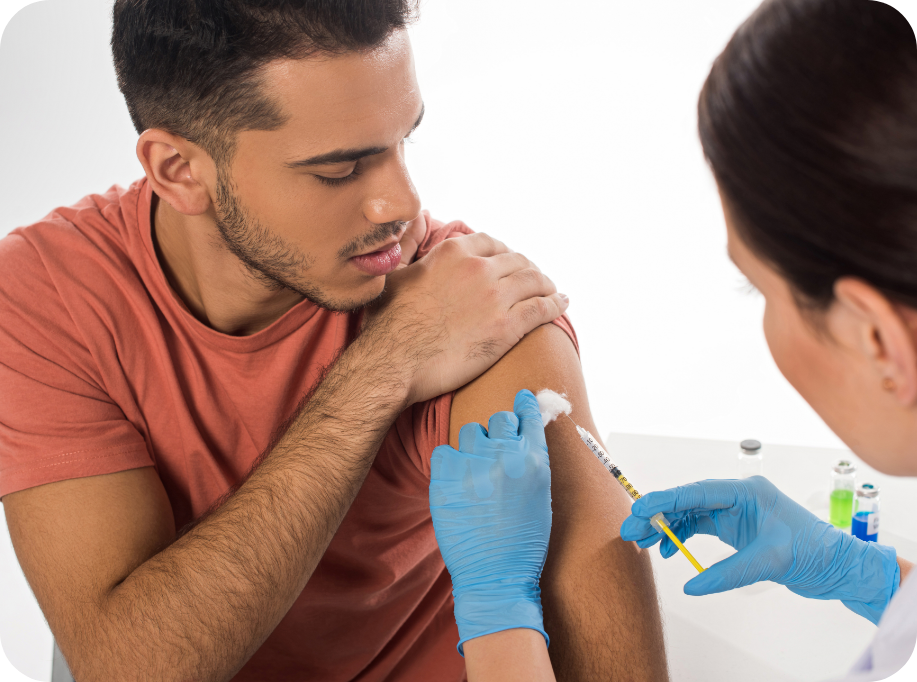

What are Biologic Therapies?
Biologic therapies in New Jersey and New York represent a relatively newer approach in managing different medical conditions. This is not unique to allergy, asthma, and immunology. Biologics have been used for asthma since Xolair was FDA approved in 2003. These therapies utilize recombinant DNA technology to produce antibodies that have very specific biological targets. Prior to prescribing a biologic, a patient will have certain biomarkers checked which can help predict who will respond to which biologic. If you haven’t responded positively to other asthma treatments, biologic therapies could help to relieve your symptoms.
How Biologic Therapy In NJ And NY Works
Conditions We Treat with Biologic Therapies
By precisely addressing the underlying causes, biologic therapies in NJ and NY provide a very safe and more targeted approach. Allergy and asthma medical conditions that utilize biologics include:
Types of Biologic Medications in NJ & NY
Omalizumab (Xolair)
Monoclonal antibody that binds to circulating IGE in the bloodstream. This prevents the binding of IGE to the high-affinity IGE Receptor (FcεRI) on the surface of allergy cells (mast cells and basophils), therefore limiting the release of mediators of the allergic response.
Xolair is indicated for the following medical conditions:
Moderate to Severe Allergic Asthma
Chronic Spontaneous Urticaria
Chronic Rhinosinusitis with Nasal Polyps
Dosing Frequency: Subcutaneous injection every 2-4 weeks
Dupilumab (Dupixent)
Monoclonal antibody that inhibits IL-4 and IL-13 signaling by specifically binding to the IL-4 receptor alpha subunit. This lessens allergic inflammation.
Dupixent is indicated for the following medical conditions:
Atopic Dermatitis
Moderate to Severe Asthma
Chronic Rhinosinusitis with Nasal Polyps
Eosinophilic Esophagitis
Prurigo Nodularis
Dosing Frequency: Subcutaneous injection every 1-4 weeks
Mepolizumab (Nucala)
Monoclonal antibody that specifically targets IL-5 and binds to it. This inhibits IL-5 signaling, reducing the production and survival of eosinophils. Eosinophils are one of the main inflammatory cells involved in allergic inflammation.
Nucala is indicated for the following medical conditions:
Severe Eosinophilic Asthma
Chronic Rhinosinusitis with Nasal Polyps
Eosinophilic Granulomatosis with Polyangiitis (EGPA)
Hypereosinophilic Syndrome (HES)
Dosing Frequency: Subcutaneous injection every 4 weeks.
Benralizumab (Fasenra)
Antibody that directly binds to the alpha subunit of the IL-5 receptor on eosinophils. This leads to programmed cell death or apoptosis of Eosinophils. Eosinophils are one of the main inflammatory cells involved in allergic inflammation.
Indicated for the following medical conditions:
Severe Eosinophilic Asthma
Dosing Frequency: Subcutaneous injection every 4 weeks X 3 doses, then every 8 weeks
Reslizumab (Cinqaire)
Monoclonal antibody that specifically targets IL-5 and binds to it. This inhibits IL-5 signaling, reducing the production and survival of eosinophils. Eosinophils are one of the main inflammatory cells involved in allergic inflammation.
Indicated for the following medical conditions:
Severe Eosinophilic Asthma
Dosing Frequency: Intravenous infusion every 4 weeks
Tezepelumab-ekko (Tezspire)
Monoclonal antibody that targets a protein called thymic stromal lymphopoietin (TSLP) which is a protein within the Alarmin cytokine family that initiates and perpetuates airway inflammation.
Tezspire is indicated for the following medical conditions:
Severe Persistent Asthma
Dosing Frequency: Subcutaneous injection every 4 weeks
Tralokinumab-ldrm (ADBRY)
Monoclonal antibody that targets IL-13. Inhibits IL-13 interaction with its receptor, thus preventing IL-13 induced inflammatory responses in the skin.
Indicated for the following medical conditions:
Moderate-to-severe Atopic Dermatitis
Dosing Frequency: Subcutaneous injection every 2-4 weeks

